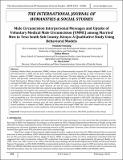| dc.contributor.author | Omukule Emojong', Hellen Mberia, Ndati Ndeti | |
| dc.date.accessioned | 2022-01-25T07:02:45Z | |
| dc.date.available | 2022-01-25T07:02:45Z | |
| dc.date.issued | 2018 | |
| dc.identifier.issn | 2321 - 9203 | |
| dc.identifier.uri | https://repository.maseno.ac.ke/handle/123456789/4642 | |
| dc.description.abstract | Voluntary Medical Male circumcision (VMMC) reduces risk of heterosexually acquired HIV. Kenya adopted VMMC as an
HIV intervention in 2008 and has been making remarkable progress towards achieving its male circumcision target.
However, uptake of VMMC is lowest among older and married men. The main objective of this paper is to examine the
nature interpersonal communication messages and their influence on uptake of VMMC among married men in Teso
South Sub County in Western Kenya. Teso Sub County is among the sub counties with low male circumcision prevalence
and high HIV/AIDS prevalence thus a target of the VMMC programme. In-depth interviews were conducted from July1-
31, 2017 with 30 married men aged between 20 and 49 years comprising 15uncircumcised men and another
15circumcised while married. Data was captured using digital recorders, and field notes were transcribed verbatim from
local language into English. Key constructs and thematic frameworks were developed using health belief model (HBM)
and Extended Parallel Process Model (EPPM) and presented verbatim using the participants own words. Based on male
circumcision messages shared interpersonally, participants were induced with threat to HIV/AIDS both in its severity
and susceptibility to it. The circumcised respondents equally felt highly susceptible to HIV/AIDS. Self-efficacy (confidence
in performing a behaviour), and especially response efficacy (the belief of efficacious of message) regarding acceptance
of VMMC as a preventive measure were the most important correlates of perception. Low response efficacy was the
critical problems in adoption of VMMC. Majority of those who had sought VMMC did it for other reasons such as peer
pressure, penis appearance, sexual satisfaction and penile hygiene and not for HIV prevention. | en_US |
| dc.publisher | The International Journal of Humanities and Social Studies | en_US |
| dc.subject | Interpersonal communication, voluntary medical male circumcision, HIV/AIDS, qualitative data, Kenya | en_US |
| dc.title | Male Circumcision Interpersonal Messages and Uptake of Voluntary Medical Male Circumcision (VMMC) among Married Men in Teso South Sub County, Kenya: A Qualitative Study Using | en_US |
| dc.type | Article | en_US |

